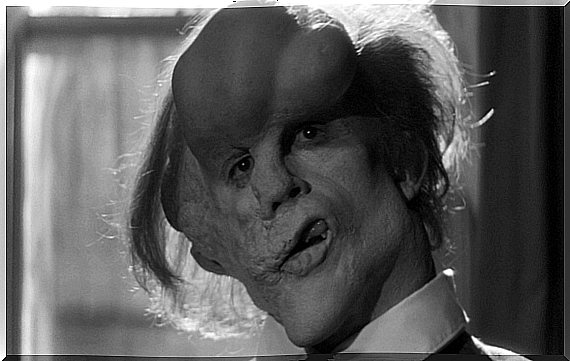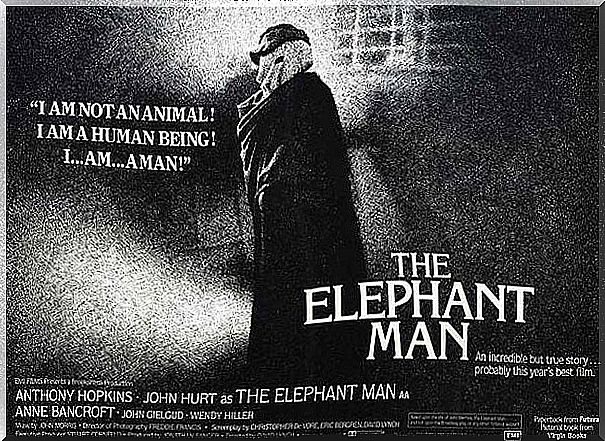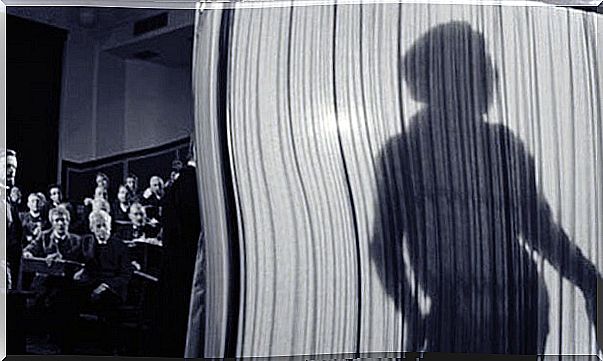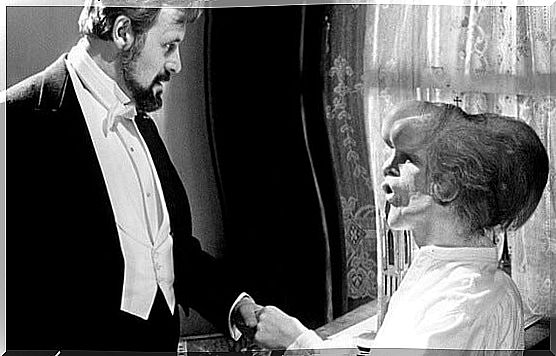The Elephant Man, A Reflection On Human Dignity

The Elephant Man is a black and white portrait of human dignity and sensitivity hidden under a deformed body. In this mythical film by David Lynch we discover the true story of Joseph Merrick, a young man suffering from Proteus syndrome who, after spending part of his life in the world of the circus, found calm in his last years at the London Hospital.
The story goes that Merrick had the soul of an artist and the heart of a poet. He had only one useful hand, and although this was small like that of a 10-year-old boy, he always showed great skill at crafts. So much so that he was able to create fascinating constructions with paper, cardboard and toothpicks. These small works he used to give to all those people who were kind to him.
When Mel Brooks entrusted David Lynch with the script for this story, he knew very well what he was looking for. The story of Joseph Merrick deserved to be brought to the big screen in a special, different way. Even more, it should be a tribute. His delicacy, his virtuosity and his intelligence had to transcend above that skin inhabited by bumps and deformities. His humanity had to surpass society itself, instantly despicable and grotesque, always eager to set its sights on what is different and strange.
The result exceeded all expectations. The film turned out to be a warm chiaroscuro canvas on human dignity, an unforgettable production where goodness emerges over perversion and the monstrous. The Elephant Man received 8 nominations for the Oscars in 1981 and although he did not win any, history has already made it a cult work, an unforgettable cinematographic jewel.

The elephant man : I am not an animal, I am a human being
David Lynch was very clear that the story of The Elephant Man should be brought to the screen in black and white. Only in this way could the stele of that Victorian underworld that accompanied the life of Joseph Merrick be shown. Only in this way was it also possible to envelop the public’s gaze of that accumulation of sensations, anguish and emotions that marked the existence of this young British man suffering from serious malformations since the year of life.
This monochrome photograph was very useful to illuminate, for example, that circus underworld where the elephant man was exhibited . The spectacle of the freakshow was the only resource available to people with deformities, and Joseph Merrick achieved notable success in Europe in the 1880s. He suffered from what is considered, even today, the most serious case of Proteus syndrome. . He described himself as follows:

Thus, and amidst the brutal and humiliating scenario contained in the world of the circus, we are suddenly presented with an emotional and compassionate look that changes the life of Joseph Merrick. It is Dr. Frederick Treves, a role played masterfully by Anthony Hopkins. Someone capable of seeing the human being under the monster’s skin, someone moved by the screams of a young man who demanded to be seen as a person, not as an animal.
The double public exhibition of The Elephant Man
Despite the fact that Dr. Treves experiences a great closeness to the young Merrick, the viewer cannot cease to intuit that there is also a deep scientific interest in him. He exhibits it to eminent pathologists, physicians and surgeons, exposes it to his colleagues, and does everything possible to ensure that the Elephant Man stays at London Hospital for life.
Once installed in a room, young Merrick finally manages to show them what is under all those bumps and thick skin. At first, the scientific community stipulates that such a body would undoubtedly be accompanied by a profound intellectual deficiency. However, soon they discover something that today is perfectly documented. Joseph Merrick was highly intelligent.
He read and wrote with powerful ease, composed poems, was a great reader and had a vision of the world as innocent as it was hopeful. The shadow of his childhood, plagued by mockery, abuse or his dark years in the world of show business and the circus had not made a dent in his heart, hardening it. As he explained himself, his hope and optimism came from love. The love that his mother had professed for him, a beautiful young woman who instilled in him a love of books and who died early.

Curiously, and despite the fact that the London Hospital raised funds to provide Merrick with a life of comfort in the institution and thus avoid the public exposure to which he had been subjected, he ended up committing an act for many unforgivable. The elephant man passed away on the morning of April 11, 1890, at the age of 27 in his sleep.
It is known that the young man was a believer, and that one of his wishes was to be buried near his mother. However, scientific interest was stronger than respect, more than defense of their dignity. The London Medical College Pathological Museum exhibited his skeleton for decades. To this day, his remains have been removed (but they are still being studied) and have been replaced by his belongings: his armchair, his handwritten letters, the hat with the sewn cloth that covered his face and head …
If there is one thing this film achieved, it is to give us an accurate portrait of the humanity contained in the battered body of Joseph Merrick. The music, the photography, the studied direction… Everything made up a more than perfect canvas loaded with humanity, there where to discover a mind that remained intact despite the humiliations, despite the mistreatment.
The elephant man never lost his delicacy, his exquisite manners, his trust in other people. Ironically, after his death he was the victim of another spectacle: that of the scientific world.









